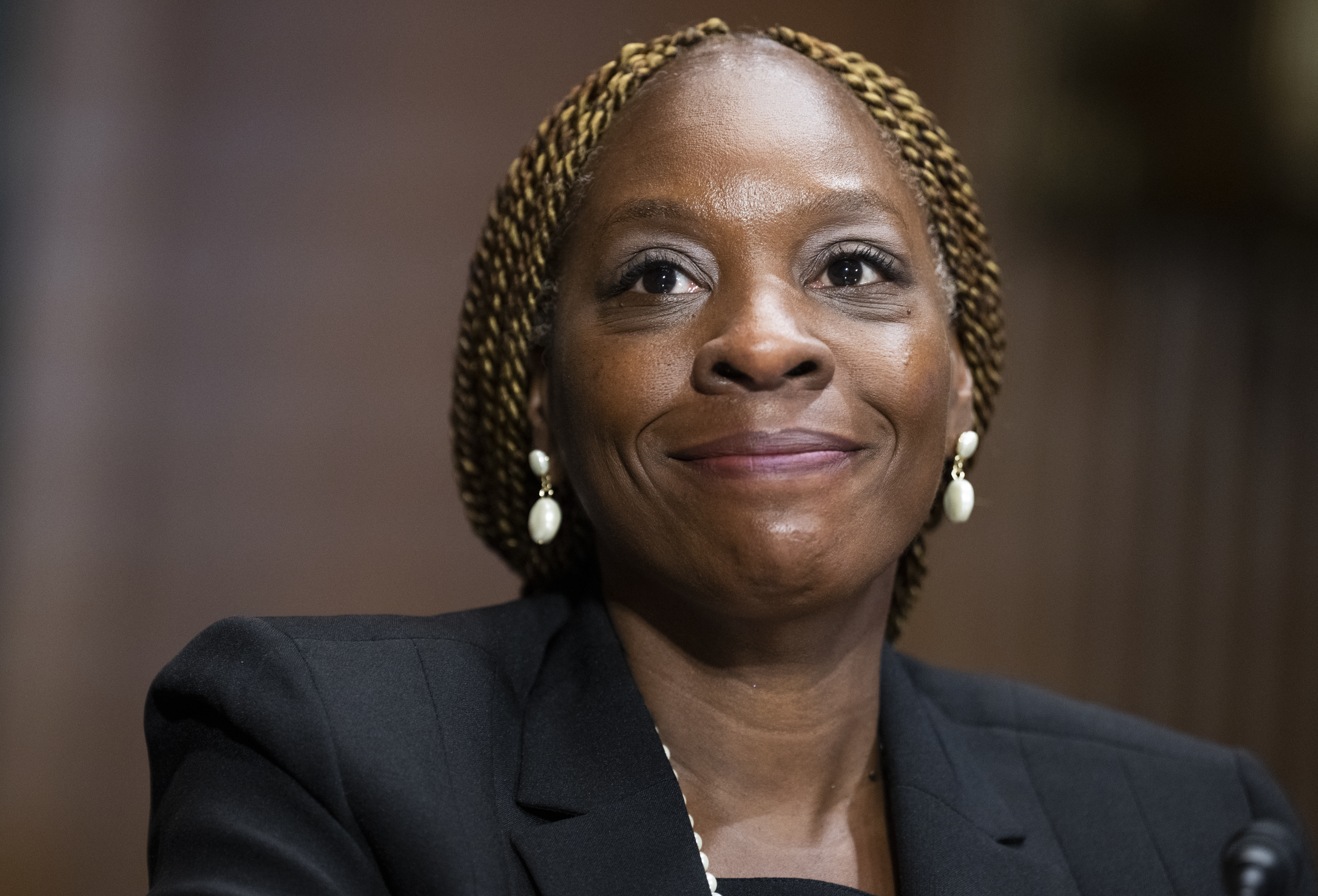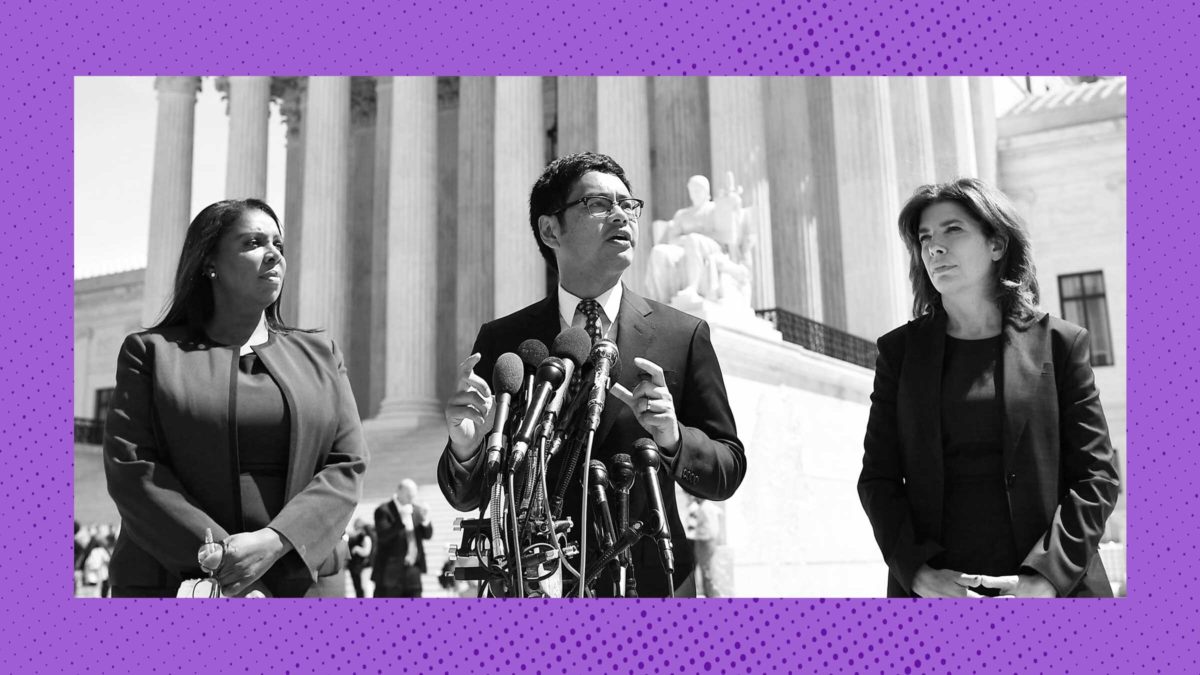As the first two years of President Joe Biden’s administration draw to a close, there are plenty of retrospectives out right now about the White House’s ongoing efforts to overhaul a federal judiciary dominated by prosecutors, BigLaw partners, white guys, and/or Trump freaks.
Overall, the results are undeniably encouraging. Two-thirds of Biden’s nominees are people of color, and two-thirds are women. More than half are “professionally diverse”—lawyers with backgrounds in civil rights, public defense, and other areas that have long been underrepresented among the ranks of federal judges. To date, the Senate has confirmed 97 of Biden’s appointees, comfortably ahead of President Donald Trump (85) at this point in his tenure. And because Democrats held the Senate in the 2022 midterms, party leadership is optimistic about, at the very least, keeping up the pace. “You can be sure that judges will remain a top priority in the Congress to come,” Senate Majority Leader Chuck Schumer said last week.
This is all great and worth celebrating. But as you read this sentence, eight of the White House’s highest-profile nominees—lawyers whose nominations are frequently held out as emblematic of the Biden administration’s commitment to change—remain unconfirmed, stuck in one stage or another of Senate procedural limbo. All eight are civil rights lawyers or public defenders; a few have been awaiting confirmation for more than a year. As successful as Senate Democrats have been moving nominees through an evenly-divided upper chamber, their inaction on these candidates is—to use a legal term of art—a real bummer.
The ignominious prize for longest wait goes to Hernán Vera, a California district court nominee who previously led one of the country’s largest providers of pro bono legal services. Vera was nominated on September 20, 2021, which by my math means he’s been awaiting a confirmation vote for a whopping 459 days and counting. Another district court nominee, Dale Ho, was nominated ten days after Vera. Ho is a voting rights lawyer best known for leading the legal fight against some of the Trump administration’s more cynical anti-democratic stunts; for at least one more holiday season, his promotion will remain on hold.
Other pending nominees have similarly impressive bios that makes their continued status as such deeply frustrating. Civil rights lawyer Jessica Clarke and former federal public defender Kenly Kato, tapped for district court judgeships in New York and California, respectively, have been waiting for 373 days apiece. The Southern Poverty Law Center’s Nancy Abudu, nominated to the Eleventh Circuit Court of Appeals, is at 347 days. Last January, civil rights litigator Tiffany Cartwright, longtime ACLU lawyer Nusrat Choudhury, and NAACP Legal Defense Fund litigator Natasha Merle were all nominated to federal district court vacancies. If any member of this trio makes it to the bench in less than a year, they’ll be lucky.
The precise rationale for these delays vary, if any one precise rationale exists. But several of these nominees have elicited vociferous opposition from the Senate Judiciary Committee’s Republicans, whose quasi-official positions on public defenders and voting rights lawyers are, in order, that they love crime and endorse voter fraud. During Ho’s confirmation hearing, Utah Senator Mike Lee excoriated Ho for his purported “open contempt for the Constitution,” which in conservative circles is a euphemism for anyone who believes that someone other than a Republican presidential candidate can legally win an election.

Natasha Merle greets Senate Judiciary Chair Dick Durbin after her confirmation hearing, April 2022 (Tom Williams/CQ-Roll Call, Inc via Getty Images)
Democrats control the Senate Judiciary Committee’s calendar and agenda. But in the current 50-50 Senate, the committee’s membership is divided equally between Democrats and Republicans, which means that united Republican opposition can prevent a nomination from going to the full Senate for an up-or-down vote. Although the Committee has voted on all eight of these nominees, only Cartwright, Choudhury, and Merle were approved via the usual procedure (“reported favorably,” in Senate parlance); the committee deadlocked on the rest.
A deadlock does not necessarily doom a nomination; at that point, nominees need what’s known as a discharge motion to escape the committee. (Unlike committee votes, the full Senate votes on discharge motions, and thanks to the tiebreaking vote of Vice President Kamala Harris, Democrats in the full Senate can accomplish what Democrats on the Senate Judiciary Committee cannot.) But discharge motions are byzantine creations of Senate procedure that are, to use another technical term, real pains in the ass: The rules are tedious and riddled with opportunities for dissenters to stall the proceedings.
Over the past two years, Republicans have been happy to invoke this power when it comes to some of their least favorite candidates. When the committee deadlocked on Ho in January 2022, Iowa Republican Chuck Grassley called him a “partisan activist who lacks the judicial temperament to serve as a federal judge,” a baseless smear which also raises the distinct possibility that Chuck Grassley has already forgotten about Brett Kavanaugh’s existence. Democrats in the 117th Congress used discharge petitions to confirm several of Biden’s nominees, but not Abudu, Ho, or Kato. (Clarke and Vera made it a little further: They had discharge votes, but like Cartwright, Choudhury, and Merle, no floor vote.)
Regardless of exactly where they sit in the process, the upshot is that every nominee, in theory, had a path to confirmation. In light of Schumer’s stated goal of getting Biden to 100 judges before the end of the year—a mark he’ll just barely miss—it’s hard not to wonder if the Democrats’ preoccupation with quantity means they were content to keep these nominees on ice.

Nancy Abudu testifies before the Senate Judiciary Committee, April 2022 (Tom Williams/CQ-Roll Call, Inc via Getty Images)
Vera and Ho and company can still become federal judges after all: Although Biden will have to re-nominate them in the new Congress, Democrats, if they are so inclined, can essentially pick up where they left off. The more foundational question, though, is whether Democrats have the stomach to do the picking up in the first place—whether party leadership is willing to put in the time and effort to confirm the targets of the worst-faith Republican attacks, or whether it would prefer to take the paths of less resistance. For as long as Democrats keep these nominees waiting, the promise of a meaningfully changed federal judiciary will remain half-kept at best.
As always, you can find us at ballsandstrikes.org, or follow us on Twitter at @ballsstrikes, or get in touch via [email protected]. Thanks for reading, and happy holidays.
This Week In Balls & Strikes
The Supreme Court Is Going Out of Its Way to Remain Unaccountable, James LaRock
Your state board of cosmetology is probably more transparent than the nine lawyers who decide which people get rights and which don’t.
Biden Is Transforming the Federal Judiciary, But the Hardest Work Is Still Ahead, Yvette Borja
Here’s where the White House’s nominations agenda likely goes next.
This Week In Other Stuff We Appreciated
Why the Supreme Court Doesn’t Want You to Hear Its Opinion Announcements Live, Dahlia Lithwick and Mark Joseph Stern, Slate
There is no good reason to withhold this audio from the public.
The Death Penalty Is Unpopular Everywhere But the Supreme Court, Matt Ford, The New Republic
The declining reliance on capital punishment has illuminated its cruelty and the incompetence of its practitioners.
A Plea to the Liberals on the Supreme Court: Dissent With Democracy In Mind, Ryan D. Doerfler and Samuel Moyn, The New York Times
The Court is abusing its power. The liberal justices should say so.
This Week In Obscure Photos of Supreme Court Justices On Getty Images


